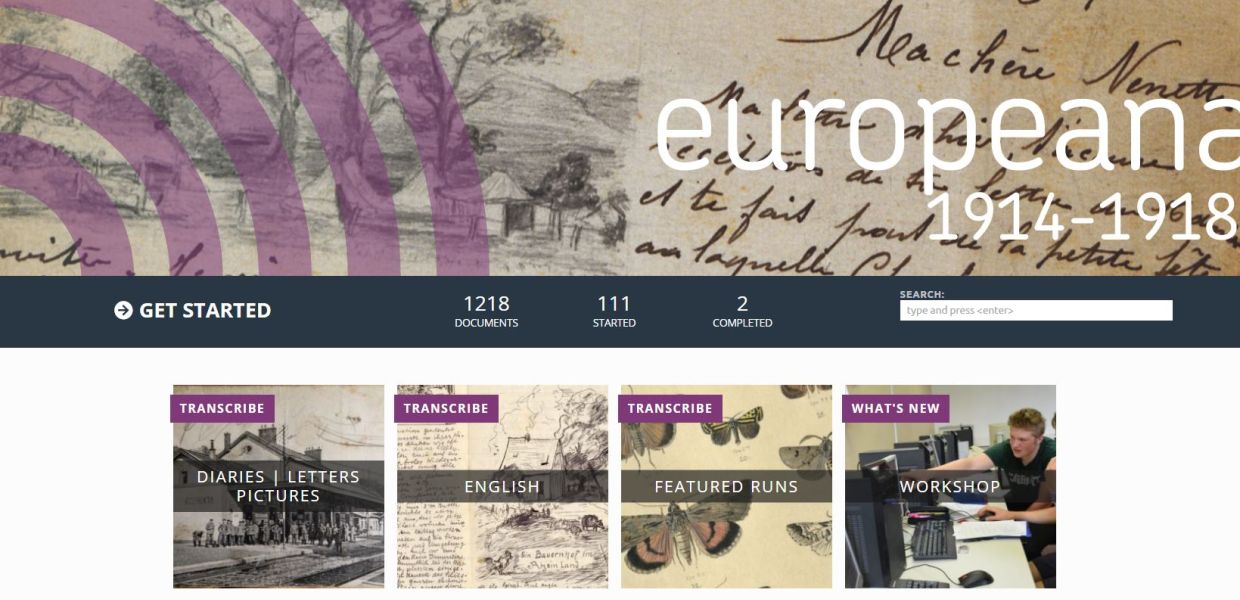Transcribing Europeana 1914-1918
We are happy to announce the launch of the recently developed Europeana 1914-1918 transcription tool at the upcoming AGM in Riga. Here the tool will be introduced along with the new concept of Transcribathon competitions.

What is a Transcribathon?
A Transcribathon is a competition where teams compete with each other to transcribe handwritten texts online. Each team works together on the transcription of a source from Europeana 1914-1918 (for example a diary). A jury will award points for the quantity and quality of the transcription and the presentation of the result, with a prize awarded to the winning team.
The first international Transcribathon will run during the course of the AGM. It will start on Monday 7 November at 2pm. Teams from the Europeana Network will have an opportunity to experience the tool hands-on in competition with teams from Latvia. Come and join a Europeana Network team by registering on Eventbrite.
Some background
Europeana1914-1918.eu is a unique digital archive of the First World War. In collaboration with the Europeana Foundation, the University of Oxford, Facts & Files, and various other European partners, the project organises collection days and digitises and exhibits personal records of the war from all over Europe.
The first collection days were held in Germany in 2011, and over 150 such events have taken in place in more than 22 countries across Europe. The first collection days in Latvia will take place on Sunday 6 and Monday 7 November from 10am to 6pm at the National Library in Riga. All are invited to digitise and share their family memorabilia on Europeana 1914-1918. If you have never participated in a collection day, now it is your chance. Submissions to the collection can be made throughout the Europeana Network Association AGM 2016.
Over the past five years, Europeana 1914-1918 has assembled almost 200,000 digital documents from all parts of Europe, ranging from postcards and uniforms to jewellery and sketchbooks. These items are only available and the metadata is relatively limited. The texts are predominantly handwritten and indexed by a summary description and keywords. Until now, users have only been able to decipher the texts of the diaries, field post cards and certificates by sight. In order to make better use of these documents a new transcription tool will be introduced: www.transcribathon.eu
The idea behind the tool is to utilise the sources in a better way by deciphering and transcribing the texts and linking them to an image. In this way, they can be effectively used for education, research and publications. In recent years, a number of citizen science projects have been developed as crowdsourcing campaigns intended to recruit volunteers to transcribe large numbers of historical documents. This is the first time that an initiative has been launched to transcribe sources from a pan-European project, such as Europeana 1914-1918.
Funded by the German Federal Commissioner for Culture and the Media, a prototype test application of a transcription tool was developed in 2014. Based on this experience the team of Facts & Files and Olaf Baldini developed Europeana transcribe as an enrichment tool especially custom made for the transcription, annotation and geo-tagging of sources from Europeana 1914-1918. At a later stage it could also be used for other sources from Europeana.

Student working on a transcription using the online tool CC-BY-SA Facts & Files
Online campaign
An online campaign will be initiated via social media and other platforms in order to build a community to carry out the transcriptions. The first step is to engage some of the 15.000+ contributors to Europeana 1914-1918, who so far have been directly addressed by quarterly newsletters.
Information events and workshops
This project provides a chance to be truly cross-generational. Young and old people can work together and contribute their specific abilities. In order to encourage participation in the Transcribathon, information events and workshops shall be organised at schools, libraries, universities and older people’s community associations. The idea is to spark an interest, especially in students, of working with handwritten historical sources. The involvement of older people makes it possible to benefit from their knowledge of older handwriting techniques.
In 2015 and 2016, historical media workshops were organised by Facts & Files and Europeana at the Primo Levi Gymnasium (high school), Berlin-Weißensee. The aim of the workshops was to teach students a variety of media skills combining the use of modern technology and original historical documents. During the workshops, the students were able to experience the entire process of working with historical documents in an interactive way by conducting research, digitising, transcribing and evaluating the sources. Original documents collected and digitised during the collection days of the Europeana 1914-1918 project served as helpful demonstration material. More information about the workshops and a video can be found here. http://transcribathon.eu/en/news/workshops/
In the coming years, a number of important WWI anniversaries will generate renewed interest among the media and public. These waves of interest should be maximised for the transcription campaigns.

Trying to get acquainted with old-German handwriting specifics, CC-BY-SA Facts & Files
